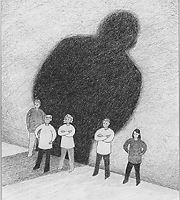![]()
| The Hibbert Assembly |
| Bullying |
| A note to teachers |
| Raising awareness of bullying is in itself an important step. Children and young people need to understand what bullying is, what consequences it can have, and why, in a civilised society, we cannot accept it. Remember that bullying can be verbal or physical abuse. It can also be indirect - making hostile remarks about someone to a third party. It is vital to create an ethos in the school where each child feels self-worth and is respected by, and respects, others. |
| Children should be praised for acts of kindness and consideration and for co-operative behaviour. It can be helpful to adopt classroom strategies where children learn to work together in groups. |
 |
| You will find excellent advice on maintaining a
school policy on bullying and on how to tackle problems when they occur
in Bullying: don't suffer in silence; an anti bullying pack for schools.
HMSO 1994 which resulted from the Sheffield University anti bullying
project and is based on the experience of a number of primary and
secondary schools. There are an increasing number of other useful books
including: 101 Ways to deal with Bullying, M. Elliott, Hodder and Stoughton; Bullying: a practical guide to coping for schools, M. Elliott, Longman; Bullying at School: what we know and what we can do, D. Olweus, Blackwell; Coping with Bullying in Schools, B. Byrne, Cassell. Other books about bullying amongst young people can be found at Stonethrow You can obtain a leaflet, Bullying and How to Beat it, from Childline (bullying leaflet), Freepost 1111, London N1 0BR. |
 Click
here to return to Bullying home page.
Click
here to return to Bullying home page.
 Click
here to return to the Hibbert Assembly homepage
Click
here to return to the Hibbert Assembly homepage
![]()